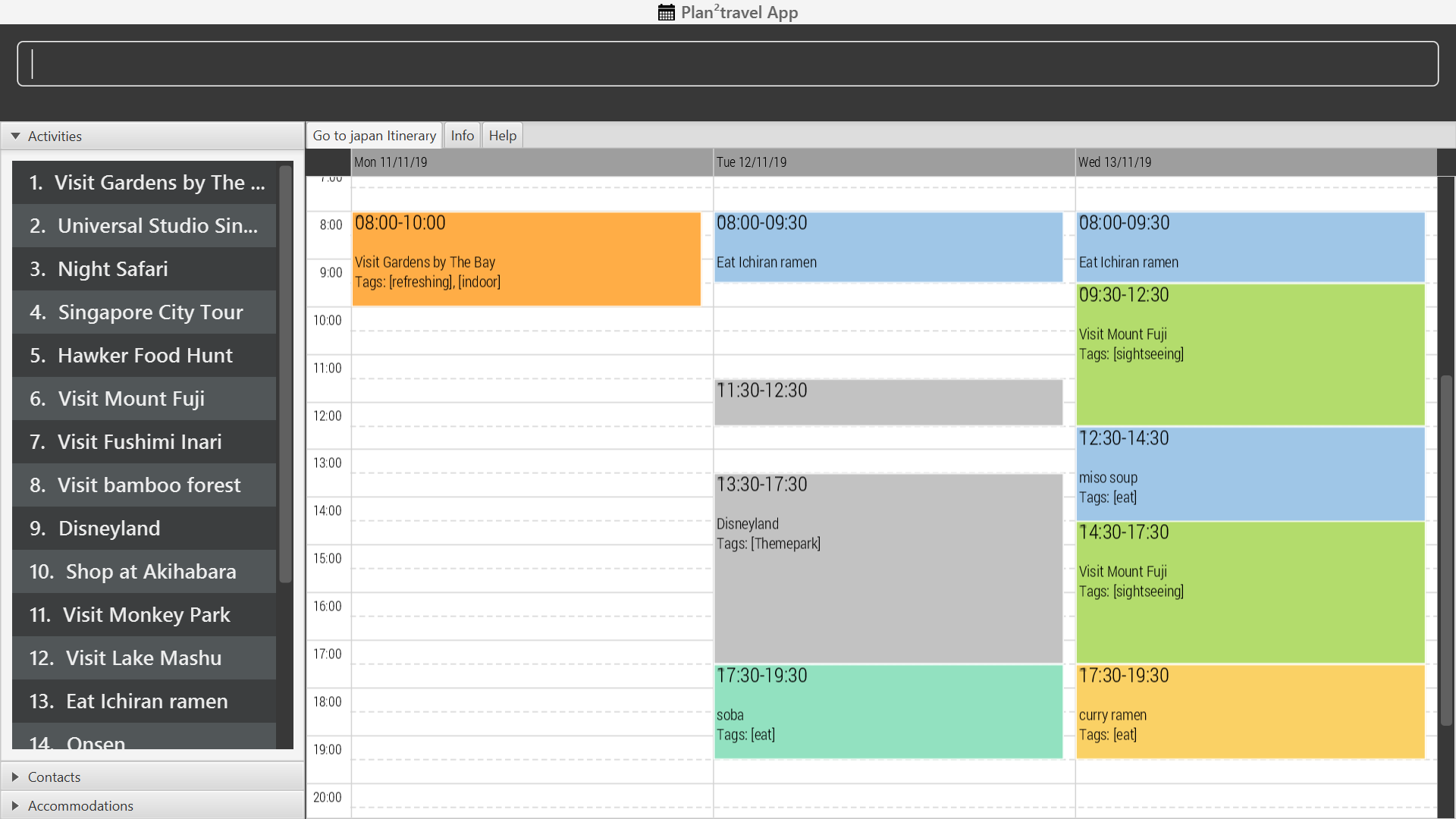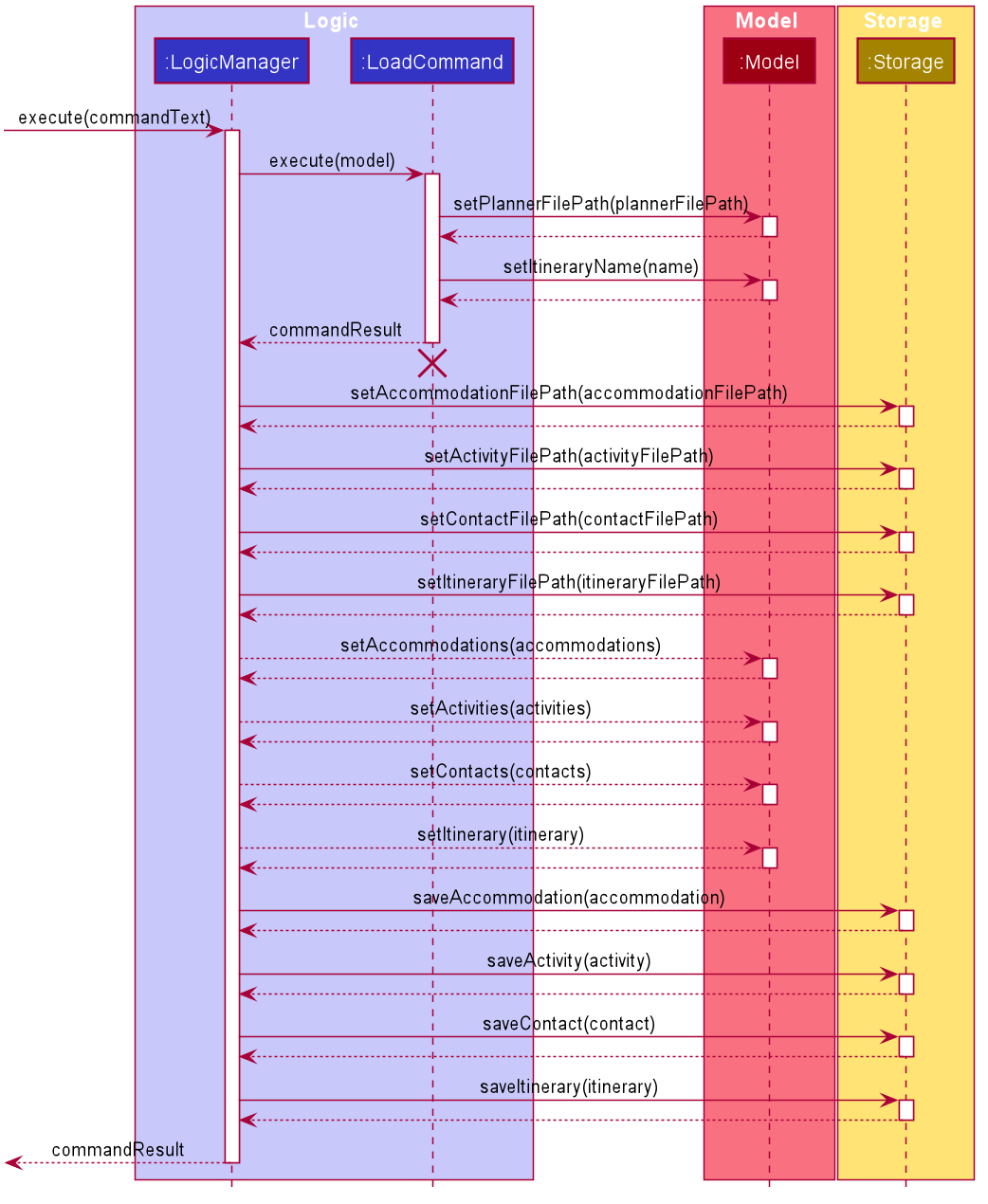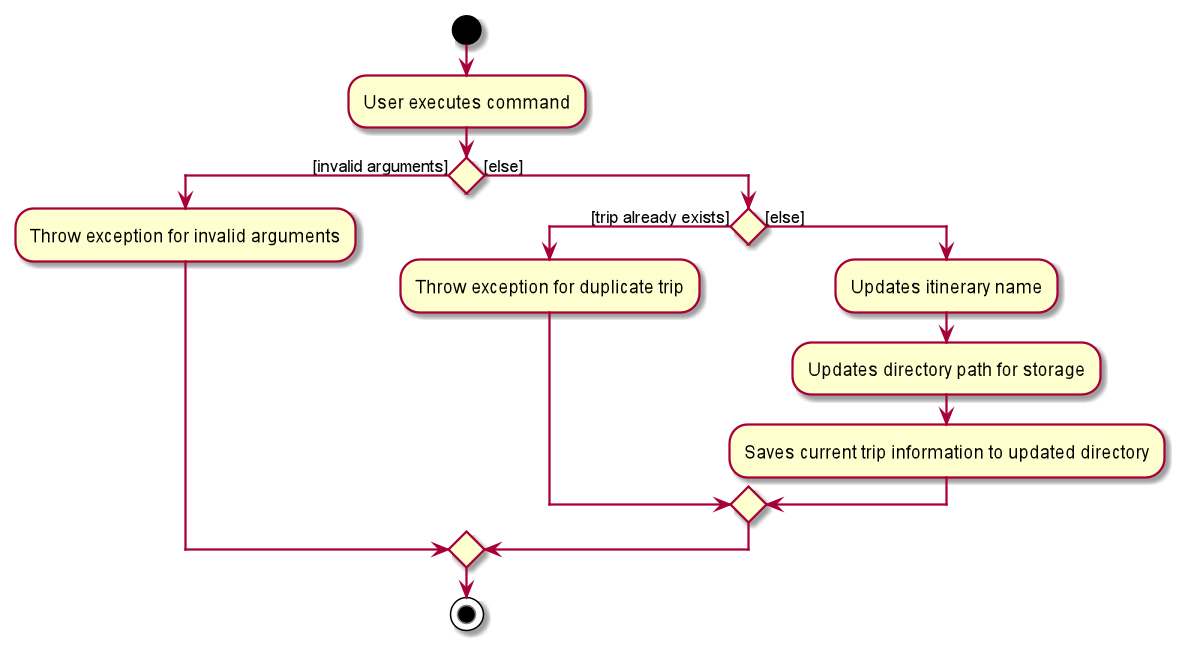PROJECT: Plan²travel
This portfolio aims to document the contributions that I have made to the Plan²travel project.
Plan²travel Github link: https://ay1920s1-cs2103t-t09-1.github.io/main/
Introduction
Plan²travel is a desktop travel planning application. The application is targeted at fellow university students who
travel infrequently and would greatly benefit from an application that helps organize their travelling information when they plan their own itinerary. Plan²travel has the ability to store and display information such as activities, accommodations, contacts and an itinerary which comprises of a list of day. Each day is displayed with a list of activities that is scheduled.
The user interacts with the application using a Command Line Interface (CLI), and it has Graphical User Interface GUI created with JavaFX.
It is cross-platform and can be compiled for both Windows and Mac OS.
Below is a screenshot of our application:

Summary of contributions
Below is a summary of the contributions that I have made to the project. |
Major enhancement:
-
Added and modified commands to facilitate trip management
-
What it does: allows the user to create new trips, load and rename existing trips, make copies of existing trips and also clear existing trip information.
-
Justification: This feature improves the product significantly because it allow users to plan for multiple trips. This removes the initial limitation of only being able to plan for a single trip at a time. Under the initial limitation, users would have had to constantly overwrite their trip plans and lose any previous plans that they have made.
-
-
Functional Code Contributed: Update 1 | Update 2 | Update 3 | Final Update
Other Contributions:
-
UI:
-
Documentation:
-
Contributed to the User Guide and Developer Guide for this project. See below for more details.
-
-
Community:
-
Over 10 Pull Requests on Github
-
Over 15 Reviews on Github
-
Overall Code Contribution here
Contributions to the User Guide
Given below are sections I contributed to Plan²travel User Guide. They showcase my ability to write documentation targeting end-users. |
Planning a new trip: new
Creates and loads a new empty trip with desired name.
Format: new n/NAME
-
Compulsory field, name, must be present.
-
Name cannot exceed 30 characters.
-
Name can only contain alphanumeric characters and spaces, and cannot be left empty.
-
Name of an existing saved trip cannot be used.
-
Name is reflected as itinerary name.
Examples:
-
new n/Iceland Trip
Creates a new, empty trip plan that has the name "Iceland Trip" and saves it.
Review an existing trip: load
Loads a saved trip with desired name.
Format: load n/NAME
-
Compulsory field, name, must be present.
-
Unsaved trip plans cannot be loaded.
-
The current trip plan cannot be reloaded.
-
Name is reflected as itinerary name.
Example:
-
load n/Greenland Trip
Loads an existing, saved trip plan that has the name "Greenland Trip".
Make a copy of an existing trip: copyto
Creates and loads a copy of current trip using desired name.
Format: copyto n/NAME
-
Compulsory field, name, must be present.
-
Name cannot exceed 30 characters.
-
Name can only contain alphanumeric characters and spaces, and cannot be left empty.
-
Name of an existing saved trip cannot be used.
-
Name is the only visible difference between the copy and the original trip plan.
-
Name is reflected as itinerary name.
Examples:
-
copyto n/London Trip
Creates a copy of the current viewable, saved trip plan. The trip plan copy will have the name "London Trip".
Clears existing trip: clear
Clears all current trip information except for name.
-
Name is reflected as itinerary name.
Format: clear
Contributions to the Developer Guide
Given below are sections I contributed to the Developer Guide. They showcase my ability to write technical documentation and the technical depth of my contributions to the project. |
Trip management
Plan²travel allows the user to create new trips, load and rename existing trips, make copies of existing trips and also clear existing trip information.
List of commands that helps with trip management:
-
new n/NAME— Creates and loads a new empty trip with desired name -
copyto n/NAME— Creates and loads a copy of current trip using desired name -
load n/NAME— Loads a saved trip with desired name -
set n/NAME— Renames current trip to desired name -
clear— Clears all current trip information except for name
Current Implementation
A trip (or trip plan) will have a name that is identical to the directory name which it represents.
The directory will be accessible via the data/{Directory Name} directory path of the home folder
which the plan2travel.jar is stored in.
For example, a trip named "Japan Trip" will represent a Japan Trip directory. This directory can
be accessed using the data/Japan Trip directory path.
The directory will contain the accommodation.json, activity.json, contact.json and
itinerary.json of the current saved trip.
The trip management mechanism is facilitated by UserPrefs where the desired directory path is
stored internally as plannerFilePath.
Operations to access plannerFilePath are exposed in the Model interface as Model#getPlannerFilePath()
and Model#setPlannerFilePath(Path) respectively.
Given below is the sequence diagram of how the load operation works:

load command
The lifeline for LoadCommand should end at the destroy marker (X) but due to a limitation of PlantUML,
the lifeline reaches the end of diagram.
|
The sequence diagram above can be described by the following sequence of events:
-
LoadCommandis executed -
LoadCommandupdates theUserPrefsplannerFilePathand theItinerarynameProperty -
LogicManagerupdates the respective file paths (that have been updated due to changes inplannerFilePath) in theStoragecomponent -
LogicMangerupdates the respective lists in theModelcomponent based on the new file paths -
LogicManagersaves the respective lists in json format in directory designated byplannerFilePaththrough theStoragecomponent
The following activity diagram summarizes what happens when a user executes a copyto command.

copyto commandDesign Considerations
Aspect: How the Logic component executes set
-
Current Choice: Deletes current directory before saving new directory containing previous json files
-
Pros:
-
Uses
File#delete()which is platform-independent and helps in ensuring the stability of the application.
-
-
Cons:
-
May seem less intuitive. Deletion methods are used instead of renaming methods (which may be more appropriate given that
sethelps to rename the current directory). -
Likely to be more costly in terms of execution as it involves deleting the previous directory and saving a new one.
-
-
-
Alternative: Rename current directory and avoid saving over the updated directory.
-
Pros:
-
Likely to be less costly in terms of execution as it does not involve deletion and saving of directories.
-
-
Cons:
-
Uses
File#renameTo()which is platform-dependent and may contribute to a less stable application.
-
-
Aspect: How the commands execute based on Java API methods
-
Current Choice: Uses methods from
Filesuch asFile#delete()andFile#exists()-
Pros:
-
Methods used do not throw an
IOExceptionand may help ensure the stability of the application.
-
-
Cons:
-
It may be difficult to diagnose issues that may arise.
-
-
-
Alternative: Uses methods from
Filessuch asFiles#deleteIfExists()andFiles#list(Path)-
Pros:
-
Methods can throw an
IOExceptionwhich can help to diagnose issues.
-
-
Cons:
-
However, certain usages of these methods can result in an
AccessDeniedExceptionwhich contributes to a less stable application.
-
-
New
-
Creates and loads a new empty trip with desired name
-
Prerequisites: Arguments are valid and no existing saved trips have the same name. A name must be provided.
-
Test case:
new n/Japan Trip
Expected: Creates a new empty trip named "Japan Trip". The name is reflected as the itinerary name. -
Test case:
new
Expected: Planner name not specified -
Test case:
new n/Iceland Trip,new n/Iceland Trip
Expected: This planner already exists
-
Copyto
-
Creates and loads a copy of current trip using desired name
-
Prerequisites: Arguments are valid and no existing saved trips have the same name. A name must be provided.
-
Prerequisites: Populate a new trip using the following commands:
-
new n/China v1 -
add activity n/Visit QinShiHuang’s Tomb a/Xi An du/240 t/history -
add accommodation n/China World Hotel a/Beijing t/5star
-
-
Test case:
copyto n/China v2
Expected: Creates a copy of the current trip named "China v2". The name is reflected as the itinerary name and is the only visible difference when compared to the original trip. -
Test case:
copyto
Expected: Planner name not specified -
Test case:
copyto n/China v1
Expected: This planner already exists
-
Load
-
Loads a saved trip with desired name
-
Prerequisites: Arguments are valid and no existing saved trips have the same name. A name must be provided.
-
Prerequisites: Populate 2 new trips using the following commands:
-
new n/China -
add activity n/Visit QinShiHuang’s Tomb a/Xi An du/240 t/history -
add accommodation n/China World Hotel a/Beijing t/5star -
new n/Japan -
add accommodation n/Crowne Hotel a/Tokyo p/8137973142 t/5stars -
add activity n/Visit Aquarium a/Tokyo p/812487941 du/120 c/20.00 pr/3 t/marine
-
-
Test case:
load n/China
Expected: Loads the existing trip that has the name "China". The name is reflected as the itinerary name. -
Test case:
load
Expected: Planner name not specified -
Test case:
load n/China
Expected: This planner has already been loaded
-